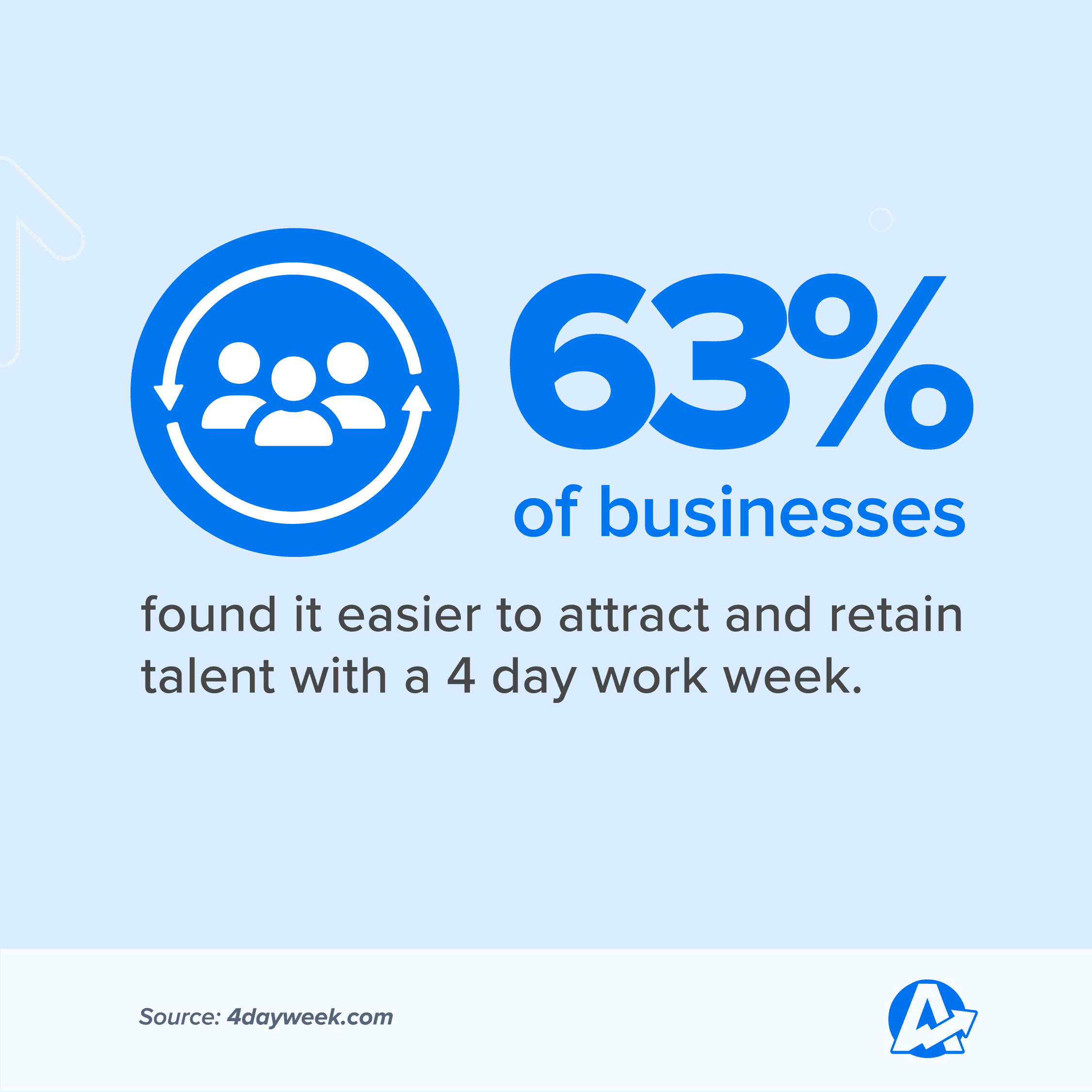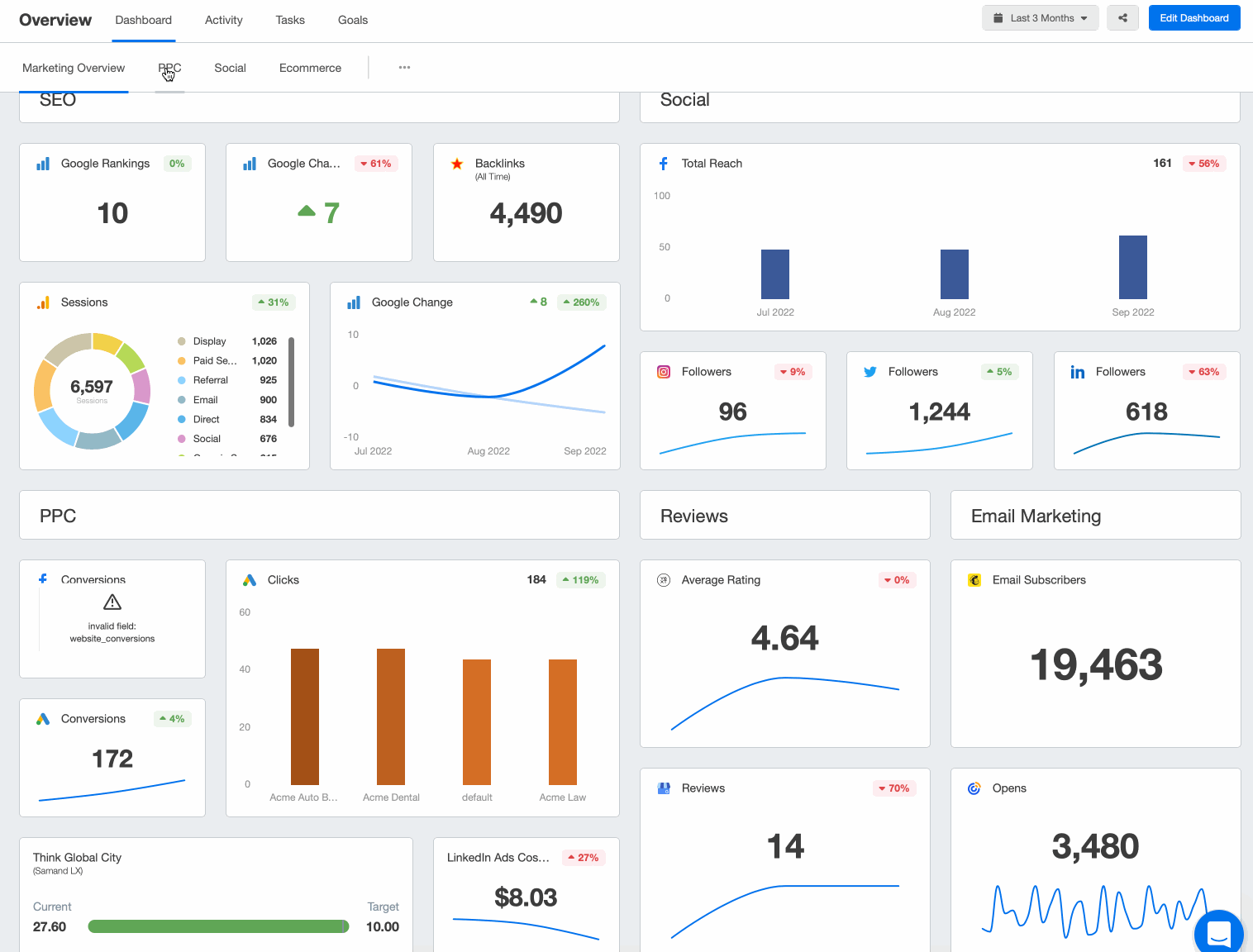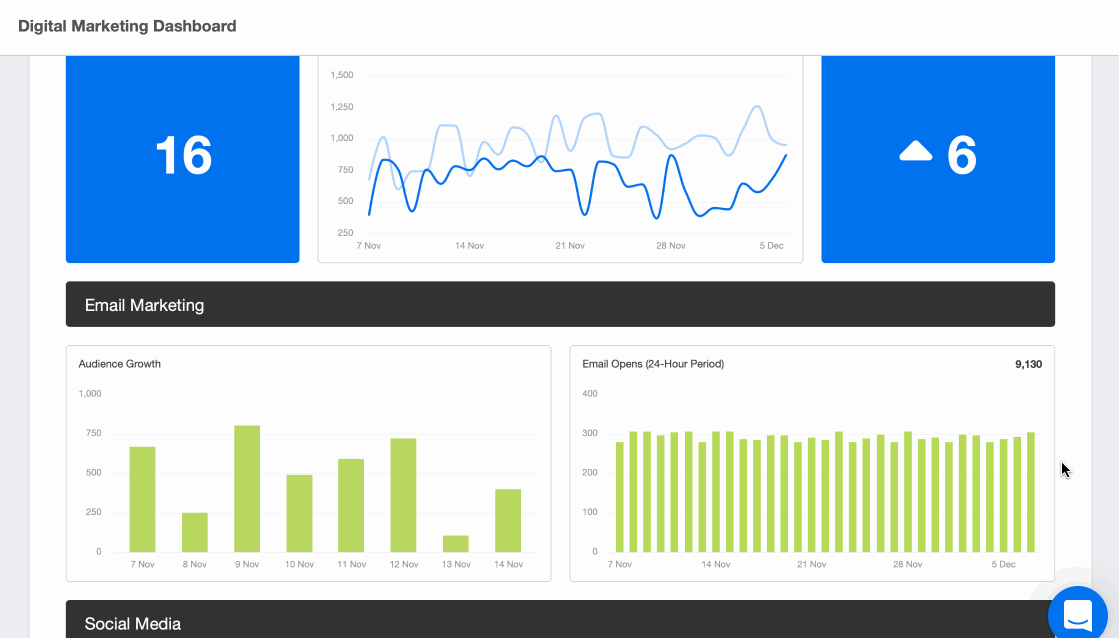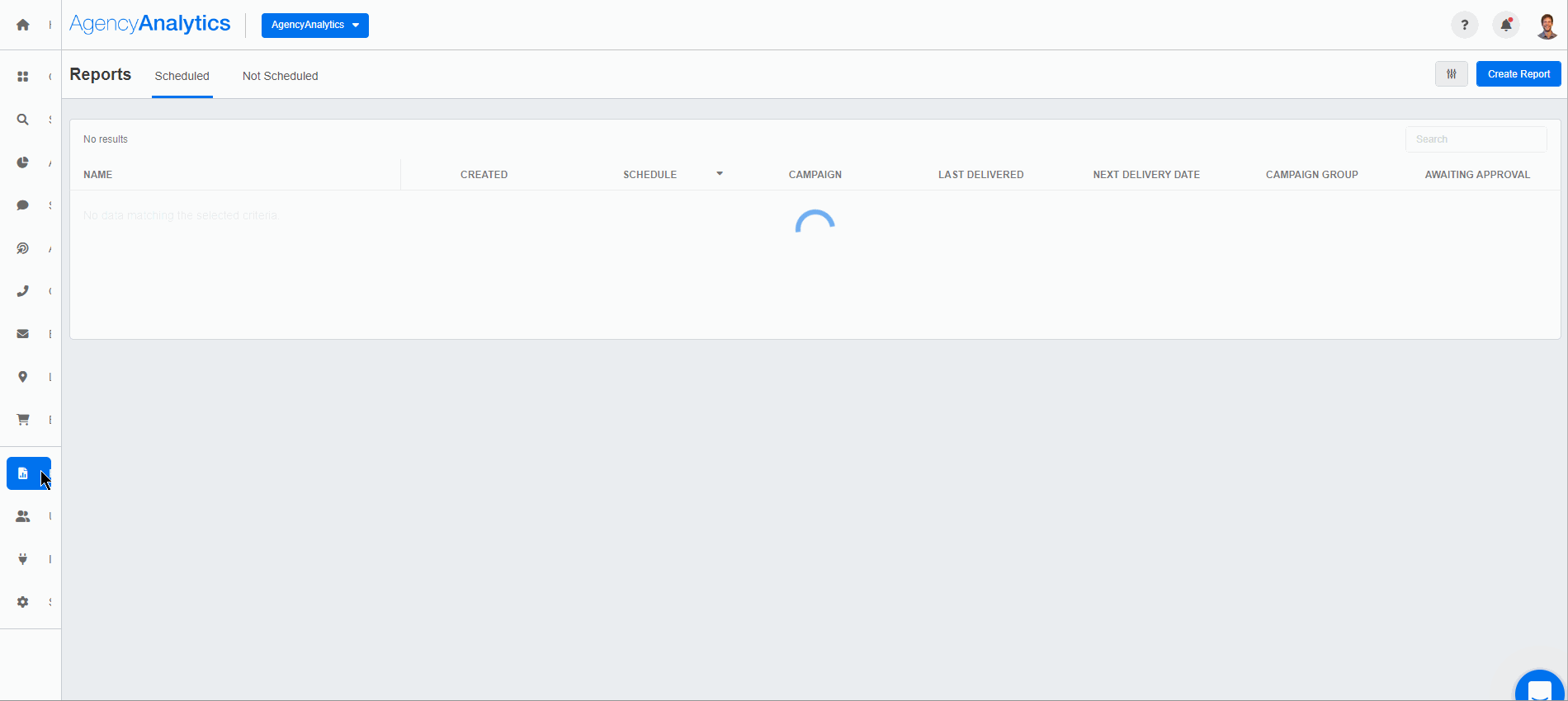Table of Contents
Table of Contents
- What Is a 4-Day Work Week for a Marketing Agency?
- Piloting the 4-day Workweek
- Why Switch to a Four-day Workweek?
- 5 Benefits of a Four-day Workweek–According to Agencies
- The 6 Cons of a Four-day Workweek
- What Agency Owners Should Know Before Trying a 4-Day Workweek
- Taking Baby Steps Towards a 4-day Work Week
- 6 Tips To Make the 4-Day Work Week Work
- Productivity Means Working Smarter, Not Longer Hours
7,000+ agencies have ditched manual reports. You can too.
Free 14-Day TrialQUICK SUMMARY:
The four-day work week presents challenges and opportunities for digital marketing agencies, balancing the need for creativity and analytical rigor for their clients with enhanced work-life balance for their employees. Studies suggest that reducing work hours boosts productivity, despite concerns about decreased time for revenue-generating activities. This article covers the benefits of a 4-day work week, how to maintain client satisfaction, and how to adapt to modern work environments.
At first, the question was whether marketing agencies should transition to a remote workforce–or a hybrid one, at the very least. But remote work has exacerbated workplace burnout to the point where it has outlasted–and even surpassed–pandemic levels.
As Harvard Business Review put it, people are beyond burned out.
This alarming fact has prompted the workforce to look for solutions and question outdated work expectations. The option to work remotely is no longer an impossible demand but a common job perk. Now the question is whether a 4-day workweek is the next best option for businesses, agencies, and their employees to thrive in a hybrid work environment.
We surveyed 13 agencies to hear what they had to say about the drawbacks and benefits of a 4-day work week. Three of them have already made the transition. Here’s what they had to say.
What Is a 4-Day Work Week for a Marketing Agency?
The premise of a four-day work week is simple: employees work four days a week and have three days of rest, as opposed to the traditional five days on and two days off.
You might be asking yourself: Is a four-day workweek feasible in a fast-paced and competitive setting like digital marketing? What would does working fewer hours look like? And how can a marketing agency balance creativity with the business and analytical needs to run a successful agency...all with reduced hours?
“The biggest input a marketing agency has to generate revenue and profit is staff time,” says Nathan Harding, CEO at Yo Media, adding, “if you reduce this by 20%, you’re effectively reducing your ROI for the agency by a similar amount.”
But if the entire country of Belgium passed legislation allowing the four-day workweek for those who want it, it must be possible. And who knows... with enough traction, one day, there may be the chance of making the 4 day week global.
And there are countless studies to back up this decision: reducing the number of working hours increases productivity. Of course, taking a theory and putting it into practice for your busy marketing agency is another matter. After all, working fewer hours may have consequences, like an impact on your bottom line.

A critical point of clarification is that a 4-day workweek for employees does not necessarily mean an agency is open and available to clients only four days out of the week.
Let’s dive deeper into what a four-day workweek looks like.
Is a 4-Day Work Week Still a 40-Hour Work Week?
In some agencies, a four-day workweek is still a full 40 hours of work split into four days, with a compressed schedule. So, for instance, you’d work ten-hour days Monday through Thursday and take Fridays, Saturdays, and Sundays off.
The four-day workweek can be a much-needed respite for those working in fast-paced agencies, regularly pulling 10 to 12-hour days at the office. Others may see it as an added stress to try and cram everything into four days.
“For me, the agency still needs to provide 5-day service to clients, so the balance comes with a non-fixed day for not working,” says Kieron Mayers, Operations Director at Marmalade Marketing. He suggests alternating employees’ work days so that some begin their week on Mondays and others Tuesdays, for instance.
So if your agency has multiple staff members, adopt a more flexible work schedule to ensure full coverage for campaigns, account management, and client questions.
For example:
Employee 1: Works Monday to Thursday
Employee 2: Works Tuesday to Friday
Employee 3: Takes Wednesdays Off
Etc.
More than half of our team is already on a 4-day work week, some do Monday-Thursday, and others do Tuesday-Friday and weekends off. We all work and communicate via a shared project management system. This has worked very well for our team. - Jim Vinyard, CEO and CCO of Vinyard Creative Group
Piloting the 4-day Workweek
A recent study by the Maru Group found that 79% of full-time employees were willing to fit their 40-hour workweek into a reduced four days, so it’s no surprise that large corporations are running pilot projects testing this out.
If you're thinking about running a four-day workweek trial, you need to consider the approach to moving away from the traditional five-day workweek. Currently, there are three types of 4-day workweeks:
40 hours per week (ten-hour workdays and no change in benefits) Monday thru Thursday
32-hour workweek (eight-hour workdays and the same pay or benefits) Monday thru Thursday
32-hour workweeks (eight-hour workdays with a corresponding reduction in salary and benefits) Monday thru Thursday
KPMG happens to be piloting a seasonal four-day workweek: employees get seven consecutive reduced workweeks during the summer months when it’s nicest out. Microsoft also found a 40% increase in productivity at a subsidiary in Japan, which was an overwhelming success.
Cutting the Phantom Limb of the Workweek
Most of us know that Fridays are notorious for being the least productive day of the week, which makes it the most popular workday to cut out of the workweek. Others choose to take a mid-week break, working Mondays and Tuesdays, then returning to work on Thursdays and Fridays feeling refreshed.
Meanwhile, there are those who want to avoid the Monday blues altogether and take it off their flexible work schedule. Then comes the question of whether the number of working hours should change.
Are We Locked Into a 40-hour workweek?
The traditional 5-day workweek has become so ingrained into our society and is the go-to for many companies. But this way of organizing the week is a remnant of the Industrial Revolution’s labor-rights slogans that divided the day into three equal parts that were easy to remember and easy to indoctrinate: “Eight hours labor, eight hours recreation, eight hours rest.”

In fact, this isn’t just how we organized our workweeks: the education system sets up schoolchildren’s days to go with it. The traditional 8-hour day was designed not to create rule-bending innovators and creatives. It was meant to create docile factory workers of the next generation.
And in an industry such as marketing, you have to wonder if this is counterproductive–especially when studies suggest that five hours per day is the maximum amount of productivity in a given day, especially when concentrating on a particular campaign or deliverable.
Considering we’ve been conditioned to operate at 40-hour weeks since childhood, it seems the four-day workweek sets the stage for a 10-hour workday at four days a week, which isn’t necessarily a step in the right direction.
Getting the Work Done Is Better Than Putting In The Hours
Whether your agency moves to or side-steps the 4-day workweek, one key shift that is happening across the workforce is a focus on improved productivity instead working less.
My personal opinion on this is more about work done than where and when. If I can give someone flexibility to get their work done, it doesn't matter too much if that's at 9 pm on a Saturday if that's what they want to do. - Kieron Mayers, Operations Director at Marmalade Marketing
The focus should not be on the number of hours but on the output of the work being produced. And there are many ways agencies can save time by having a shorter workweek and focusing on driving results.
Strategies like batching your work–so you’re getting multiple campaigns out the door or setting up client reports while your brain is mentally switched on to that type of task help you get those tasks done faster–with fewer errors. Streamlining your agency’s processes to free up time and getting all your work done when you’re most productive–not when you should be sitting at your desk–is another.
At the end of the day, if your content marketing team needs to write four articles for a client per week, does it matter if they got their deliverables done in four days and not five? A shorter workweek shouldn't matter as long as the quality of work remains consistent. Giving leeway will help boost employee productivity, enhance output quality, and boost mental well-being. It may even trickle to other parts of their lives, like physical health and general outlook on life.
The Covid-19 pandemic changed a lot in terms of remote work and flexibility. To allow this to continue, which can benefit mental health and reduce burnout, employers will need to trust their employees, and employees will need to earn their employers’ trust. - Kevin Lucca, Founder at LuccaAM
Agency business leaders also need to coordinate with their teams to decide who works which day or whether everyone takes the same day off, providing a more flexible or compressed schedule.
Agency Tip: Talk to your team(s) to see what they imagine a four-day week would look like. Some employees might prefer different arrangements like two half days rather than one full day off.
Why Switch to a Four-day Workweek?
So, what would be the reasoning for an agency to cut down on their billable hours and make the switch?

Here’s what the stats say about the current state of the workforce, which could be improved by implementing cultural shifts like a 4-day workweek.
According to the Harvard Business Review Survey on chronic work-related stress in the modern workforce:
89% of respondents said their work life was getting worse
67% of employees experienced increased stress levels and burnout often in 2021, a significant increase from 62% in 2020
56% of employees said their job demands had increased
In our ever-connected world, especially in the marketing industry, a four-day workweek won’t stop the emails coming in from 5 am to 11 pm or on a Friday night. But the systemic expectation to always be online to respond needs to change.
Want to see the benefit of a 4-day week? Try blocking a day off your own calendar a week to not be in meetings. For the last year, I've made Fridays my visionary day. What that means is no external meetings and usually no internal meetings either. - Steve Andrews, CEO at She Reigns Creative
5 Benefits of a Four-day Workweek–According to Agencies
Let’s explore the pros of four day schedules over a five day week, according to our agency survey.
1. Happy Employees = Better Performance
Your agency is only as good as its team’s performance, which translates to happier clients, employee satisfaction, and increased productivity.
When people feel valued and cared for, they naturally deliver their very best work. Your staff is at the heart of the great marketing work you produce. The happier, healthier, and more valued they feel, the more engaged, excited, and hungry they'll be to deliver their best. - Michelle van Blerck, Communications Manager at Digital Freak.
2. Retaining Talent By Preventing Burnout
One of the most common reasons for quitting a marketing agency is chronic stress and overworking. By promoting a better work-life balance, agencies can not only attract better talent but retain it, too.
In a world where burnout is becoming more common, and people wear 60-hour weeks on their sleeves like a medal of honor, to attract top talent, you need to offer something different. - Steve Andrews, CEO at She Reigns Creative
More people will want to work at your agency, so you’ll have the choice from a larger pool to set yourself apart from competing agencies, attract better talent, and improve employee retention.

(The four-day workweek) supports ongoing loyalty from existing staff and makes it easier when the time comes to put in that extra effort and go the extra mile. This helps agencies grow and thrive, while hustle culture doesn't deliver anything except disengagement and burnout. - Michelle van Blerck, Communications Manager at Digital Freak
3. Time Off Pays Off
Being good at marketing means keeping up with the times. And if you have no time to immerse yourself in the real world, how can you come up with relevant campaigns that truly speak to your audience?
One huge advantage to working four days is you have more time to relax and immerse yourself in popular culture. I often see marketers so busy all the time that their empathy drops, and they can't get into their prospects’ heads the same! So use the extra day to watch Season 4 of Stranger Things or the Wednesday series and keep your marketing relevant! - Steve Andrews, CEO of She Reigns Creative
4. You’re More Productive
Have you ever halfheartedly entered a meeting, knowing it was going to be a waste of time? Moving to a four-day workweek prompts you to question the purpose of all your agency’s activities and cut down on the non-essential (i.e., fewer meetings).
Stricter monitoring of deadlines and customer expectations to ensure the extra time off doesn’t affect the quality of our output. We required the utilization of project management tools like Asana to ensure everyone had full transparency into workloads. If the extra day off was causing delays in hitting goals or causing any one team member to get overloaded, we said the policy would be reviewed. - Michael Wisby, CEO at Two Trees PPC
While it doesn’t mean tracking your employees’ productivity to the point of micromanaging it, putting systems in place to audit your workdays and identifying places that waste time is key.
Productivity and hours worked aren’t strictly correlated. Even on an hourly-fee-based model, your clients are paying you for results. So tracking productivity and shifting to an outcome-driven agency will ultimately improve your clients’ results, too.
As the proverb goes, necessity is the mother of invention. A team of highly-motivated individuals working on a shorter schedule should look for ways to streamline their processes to meet deadlines.
5. Better Employee Engagement and Creativity
“Engagement and creativity is the lifeblood of a great marketing agency,” says Michelle van Blerck, Communications Manager at AU-based agency Digital Freak. She says that a four-day workweek shows that an agency cares about its staff’s well-being.
Tired minds aren't creative - Energised minds are primed for innovation! - Michelle van Blerck, Communications Manager at Digital Freak
We all know that stress is a creativity killer. The premise of a four-day workweek is to improve the work-life balance by “reviving tired minds, (it) boosts creative thinking and makes people more productive,” van Blerck adds.
We are made up of mostly creatives, and our minds have to be sharp and fresh. An extra day off and flexible work week allows for this to happen. - Jim Vinyard, CEO and CCO of Vinyard Creative Group
Free time = More creativity. Without giving your mind the time to wonder, you can’t come up with great ideas for that next award-winning campaign.
The 6 Cons of a Four-day Workweek
A four-day workweek could have unexpected challenges like reorganizing your entire workforce, your systems, and productivity tracking methods. In the long run, this is excellent. But in the shorter term, it means reinventing your agency’s wheels to ensure it’s a smooth-running machine. Otherwise, your agency won't be able to overcome the challenges a 4-day work week poses:
1. You Have Fewer Days Compared To Your Competitors
Marketing moves fast and is a highly-competitive industry. It’s also client-facing, which puts on that added pressure to perform and be available 24/7. Naturally, some agencies worry that they’ll fall behind:
A team working 5 days a week has more chance of beating the competition and dominating the market than a team only working 4 days a week. In fact, I would encourage my competitors to switch to a 4-day work week. - Nathan Harding, CEO at Yo Media
2. Forces You To Put Your Workforce Under a Fine Lens
When your agency is trying out a four-day work week, you need to identify who is motivated at their job and is productive instead of sitting there counting the hours until their next paycheck.
This might prompt you to cut some employees from your payroll to keep the wheels turning more efficiently. On the other hand, if your employees work only four days a week, you might have to hire more staff to keep up with the workload, which is an added expense.
Reducing to a four day workweek will reduce resources to your clients campaigns and that can only result in a drop in performance and results. - Pierre Ajram, SEO Director at AiiMS Group
3. Your Clients Won’t Understand
Ruben Roel, President of Investigator Marketing, whose agency is on a rotating four-day workweek, says that the greatest issue to overcome is their own clients’ expectations, “who are working IN their business, doing all the work, so they expect other people to support them while they're out doing the work that pays the bills.”
Until the population as a whole jumps on board with the 4-day Work Week philosophy, this isn't going to be an easy task. This is the same problem we had with Working from home - prior to the pandemic, this was a "no can do" belief. The pandemic FORCED everyone to work from home, which made it more acceptable. Without a pandemic, I think the stigma would still be there. - Ruben Roel, President of Investigator Marketing
4. Your Client Response Rates Drop
If your office is closed on Fridays, you may need to set new expectations with your clients–which might not take to them so kindly. Switching to a set four-day workweek, where the office is closed on a set day each week, means your response rates drop–both to clients and marketing campaign tweaks.
Our job is to be the most responsive to our clients and their goal from a marketing perspective. Being proactive rather the reactive is the difference between successful & unsuccessful campaigns. - Pierre Ajram, SEO Director at AiiMS Group
However, as noted earlier, this would primarily apply if the entire agency went to a 4-day schedule instead of rotating employee's work schedules.
5. It Could Put Your Agency at a Disadvantage
Some campaigns (like PPC) require more hands-on work to continuously optimize for the best ROI.
Our world is very similar to the money management world. We are responsible for large amounts of money which need to be managed correctly. Campaigns can be volatile at times, and our attribution model needs to be aligned with these risks. In order to have effective and efficient campaigns in a world where competition is fierce, a 4-day work week would put you at a disadvantage. - Abe Rodriguez, Business Development at Live Media Digital
With fewer hours to leverage in a week, you’ll need to decide whether you’ll be cramming five days of work into four or simply doing less. But with the same amount of work on your plate, it can cause more stress for your teams to continuously catch up.
Increased stress for team members. If you now have to fit 5-days of work into 4-days, time constraints will most likely create stress and headaches. - Nathan Harding, CEO at Yo Media
6. It’s Not For Everyone
Some of the agencies we surveyed noted that a four-day workweek is more feasible for larger agencies with a greater workforce or those in a specific niche, making it easier to spread out the workload.
“If the agency is large enough that there is coverage for the accounts, then it could be plausible,” says Kevin Lucca, Founder at LuccaAM, adding that “the idea brings a lot of challenges and would likely not be feasible for smaller-team agencies.”
I believe a 4-day work week may be possible for large agencies, agencies that either provide services to a very specific industry and/or provide specific services where advance planning and scheduling software may be leveraged. - Adam Allen, CEO of LeaseMyMarketing
What Agency Owners Should Know Before Trying a 4-Day Workweek
The topic of the four-day workweek for agencies certainly has valid benefits and drawbacks. So despite the stigma, you can only change what’s under your control by coming up with solutions to mitigate the downsides.
Steve Andrews, CEO of She Reigns Creative, justifiably notes that “many agency owners’ biggest fears is paid media not being available for 3 out of the 7 days of the week.” He believes that “by implementing smart limits on ads to avoid campaigns running out of control, you can absolutely make this feasible.”
Marketing is one of those industries where people "feel" like they need to be working constantly, but I'm of the belief that with planning, an agency can absolutely move to a 4-day week. - Steve Andrews, CEO of She Reigns Creative
Every marketing agency is unique: they are in a different life cycle stage or have a different size, location, and workforce. So before making the decision to downsize and upgrade your agency’s workweek, there are some important factors to consider.
Jim Vinyard, CEO and CCO of Vinyard Creative Group has already shifted his agency to a four-day work week. He says communication is crucial for this to work and you need the right tools, including:
Shared project management systems
Live marketing dashboards
Giving clients access 24/7 to clearly communicate their work and ROI–without the back-and-forth phone calls and emails
Some agencies who responded to our survey said that they haven’t shifted to a 4-day work week but then went on to describe how they have a four-day work week on a rotating, staggered schedule. Partly, this is to ensure that clients don’t notice a break in services.
Be very careful and make sure you have a skeleton crew on the days that your major staffing cohort is not working. - Ben Tippett, CEO at Perth Digital Edge
This makes it even clearer that agencies need to differentiate between office hours and the work week and that they don’t have to be the same.

Streamline your agency’s workflows and clear up client communication with live marketing dashboards. Try AgencyAnalytics Free for 14 days!
The most important measures we put in place is our shared project management system for our internal team, and we created real-time live analytic dashboards for our clients with 24/7 access to see ROI and our work! We also do monthly zoom meetings with clients, weekly team zoom meetings, and weekly email updates with clients. Communication is key to a successful 4-day work week. - Jim Vinyard, CEO and CCO of Vinyard Creative Group
Be Transparent With Your Clients
When clients email five days a week and expect excellent customer service, a four-day workweek can prompt further delays in responding, which according to Zeke Domowski, CEO of Creatively Innovative, is unprofessional.
Be transparent with your clients on expecting longer turnaround times. This can be done with a simple email signature stating your office hours and implementing automated systems until you respond.
Four-day workweeks are inherently flexible, giving extra room for priority projects:
It can mean that our clients need to wait a while for any requests late in the week, but we have the option for people to switch the extra day off should a special project require it. - Michael Wisby, CEO at Two Trees PPC
However, clients may not understand that your agency is closed one day a week. Responding to clients in a timely manner and continuing to deliver top results is still a must.
Ultimately, the real question, in my mind, is whether or not your clients are equally amenable to a 4-day work week. At the end of the day, implementing a 4-day work week as a perk to attract talent is meaningless if it provides a poor customer experience. - Adam Allen, CEO of LeaseMyMarketing
Rotate Your Workforce
There are ways around the issue of longer turnaround times. For instance, your teams don’t all have to take the same day off.
The most difficult shift will be introducing it to clients, especially those that want tight turnaround times. However, this can be handled by making the 4-day week flexible for different employees, allowing you to deliver to your customers who operate on 5-day weeks or more. - Michelle van Blerck, Communications Manager at Digital Freak
Roel, President at Investigator Marketing suggests creating floating teams with “an alternating 4-day work week to ensure your agency–from the outside-in–looks like it's working five days a week when only half of your team is missing one day out of the week.”
As long as your agency is still producing great work, your clients won’t notice. They’ll be looking at the results, not your opened hours a week.
Taking Baby Steps Towards a 4-day Work Week
Some agencies note the obvious issues with a reduced workweek in terms of scheduling, lags in communication, and potential project delays. However, as we see below, there are ways to work around this to ensure that the quality of your work doesn’t drop.
Marketing is about delivering the best possible work for every client, and that can't happen when staff are tired or burned out. - Michelle van Blerck, Communications Manager at Digital Freak
You can still grow your agency by working four days a week. But you need the right marketing agency tools to streamline your workflows and even the right agency partnerships to get things done. Have the wrong systems in place, and your 4-day work dream can come crumbling down before it even takes off.
You lose nothing by trying something new–even for a trial period–especially when studies show that productivity remains consistent or even increases. Imagine what you'll gain. - Michelle van Blerck, Communications Manager at Digital Freak
Although Adam Allen, CEO of LeaseMyMarketing warns that you should “consider the impact this will have on your clients and what, if any, negative ramifications this may have on the agency. Once you go to a 4-day work week, it may be difficult, or impossible, to revert back.”
Remember that you don’t need to make the shift to a four-day workweek right away. The important thing is to take steps towards achieving your agency’s goals in a way that works for your agency’s bottom line, your client services, and your teams’ well-being.
It isn’t about getting it right the first time but iterating to get there.
So before making any drastic long-term decisions, test it out by reducing the number of hours gradually by tracking your productivity baseline and reducing your teams’ work hours accordingly. Then check in on how it’s going.
Discover your biggest timesucks–like extra meetings that aren’t productive and manual reporting. That’ll help you assess your marketing productivity and set the right systems in place to ensure your success.
Audit your workday, as well as your workweek. See what activities can be outsourced, automated, or eliminated altogether.
Below are six tips to use your billable hours more wisely.
6 Tips To Make the 4-Day Work Week Work
If you decide to make that leap into a 4-day work week, here are a few ways to make that transition a little bit smoother.
1. Track Productivity KPIs
With less time on your hands, your teams need to work smarter. And that’s done by tracking productivity metrics like utilization rate to assess your productivity honestly. Using smarter metrics tracking your output and productivity will allow you to optimize your time and the results your campaigns are driving.
This also means cutting out the nonessential metrics you’re tracking for your clients and reporting on the KPIs that matter most.
Clients appreciate outcome-driven agencies. That’s why they pay you.

Use this exact template in AgencyAnalytics with a free 14-day trial
2. Put Deliverables First
Getting a day off of work should always be dependent on getting your work done. The output and quality of your teams’ work matter just as much (if not more) on a 4-day workweek.
The good news is that if an important project needs more work, then you have that extra day to complete it. It boils down to trusting your agency’s employees to make the most of their time.
With our team being better rested, it means that the 4 days are of a better quality output, and the team is incentivized to hit their deadlines to get the extra day off. - Michael Wisby, CEO at Two Trees PPC
3. Work With Your Team & Your Clients
Communication is key for a positive agency-client relationship. If you choose to switch to a four-day workweek, your teams need to be on the same page and agree on a format.
Talk to your team(s) first. See what they think and whether a 4-day week is right for all people. Some people might prefer different working arrangements–two half days might be better than one full non-working day. - Kieron Mayers, Operations Director at Marmalade Marketing
And if your new work weeks affect your office hours, your email response times, or the days you’re available for meetings, your clients need to know about it too.
Don’t forget to tell your customers, be transparent and ensure out-of-office emails are enabled. - Michael Wisby, CEO at Two Trees PPC
4. Update Your Tech Stack
When you have fewer hours to work, you need marketing automation tools to do the heavy lifting and tools such as Zapier that help automate repetitive tasks. There are lots of productivity tools for both remote and in-office agencies that help with:
Communication & Collaboration
Virtual Meetings
Task and Project Management
Goal-tracking
Asset Management
Process Documentation
Design Reviews
Employee Management
Client Management
Marketing Ops
Check out the full list of remote work tools.
Invest in tools that ensure all communications are centralized and deadlines are adhered to. - Michael Wisby, CEO at Two Trees PPC
Automated Reporting
Many agencies are still unnecessarily bogged down by client reporting using manual spreadsheets to update their clients’ marketing metrics. Meanwhile, automating your reporting process saves your agency countless hours each month. Hours that your teams should spend on activities that move the needle.
Not only do you save time, but money too. Consider this:
The average agency spends 1.5 hours a month pulling data to create a single client report. At a rate of $40 per hour, that's $60 a month. If you have 20 clients, that’s a loss of at least $1200/month for your agency.
When using tools such as Agency Analytics, our team can work smart with campaign data and save enough hours in the week to make a 4-day week much more feasible. - Michael Wisby, CEO at Two Trees PPC

Schedule your reports with automated reporting to free up your agency’s billable hours.
5. Working Remotely (Spending Less Time Commuting)
While remote work has brought on higher rates of burnout, it has also brought many benefits.
I think the more likely situation is seeing a lot more flexibility across more agencies than ever before, where employees are demanded to be at their desks 8 hrs a day. - Kevin Lucca, Founder at LuccaAM
Many remote agencies have already figured out how to scale. So if you aren’t already implementing some work-from-home days, hear us out.
Remote work means your employees are spending less time commuting and more time at their desks. This can be a huge benefit to productivity and offer alternative flexible options to make a four-day workweek work for you.
6. Outsourcing
When you have fewer hours in a workweek, it makes you reconsider the tasks that can be delegated to someone outside your agency.
This opens up the possibility of partnering with other agencies or freelancers to ensure your client’s work is delivered on time while spending less money than your in-house employees’ hourly rates.
Productivity Means Working Smarter, Not Longer Hours
With advances in technology, agencies are more likely to increase their productivity. But work can be like a never-ending conveyor belt of tasks that keep coming. Agency owners and marketing managers should know when to put on the breaks and give their employees the rest they need to perform at their best.
With more flexible hours, remote working, and asynchronous work setups, employees have a greater say in how and when they work. Whether your agency is planning to embrace or oppose the four-day workweek, it’s important to pay attention to shifts in the workforce to understand what is required to retain the best talent and stay competitive.
The conversation about the four-day workweek opens up important discussion points worth considering about tracking the right performance metrics to improve an agency’s overall performance.
Perhaps, at the end of the day, it’s really about abolishing the toxic company culture of 60-hour workweeks and overtime work once and for all. What do you think?
Let us know your thoughts on the four-day workweek for agencies on Twitter @AgencyAnalytics.

Written by
Melody Sinclair-Brooks brings nearly a decade of experience in marketing in the tech industry. Specializing in B2B messaging for startups and SaaS, she crafts campaigns that cut through the noise, leveraging customer insights and multichannel strategies for tangible growth.
Read more posts by Melody Sinclair-BrooksSee how 7,000+ marketing agencies help clients win
Free 14-day trial. No credit card required.






